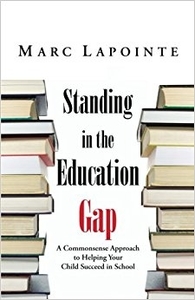In a time when grades are inflated, assessments are watered down, competition is discouraged, and trophies are handed out like free candy, students are struggling not only to learn, but to learn how to learn. In Standing in the Education Gap, Marc LaPointe presents a wise assessment of a generation that is struggling: “In the name of positive self-esteem, our children are subjected to an environment of unconditional validation,” LaPointe writes. “Nothing they do is considered ‘not good enough.’ There is no unacceptable or low standard of performance and outcomes are always positive. When we focus on building a child’s self-esteem at all costs, we create individuals who not only can’t understand their own shortcomings, but also are unable to take any form of criticism and use it to improve in areas of deficiency.” The danger, then, is that today’s over-praised students could become tomorrow’s failed adults.
[alert variation=”alert-info”]iUniverse:
Paperback:
Purchase: Powell’s | Amazon | IndieBound | Barnes & Noble | iBooks[/alert]
“The self-esteem movement is a perfect example of an idea that has been taken too far. The problem, as you’ll see, isn’t with raising kids to be confident, it’s the idea that we must do all that we can, even in the face of failure, to make sure students ‘feel good’ about themselves. It has little, if anything, to do with real accomplishments, effort or hard work. In fact, within our schools, our children are being taught that success has nothing to do with performance – it’s based on nothing at all but ensuring that we don’t injure a child’s self-esteem.”
LaPointe, who is himself both a parent and an educator, presents helpful advice on parenting children so they emerge with integrity, efficiency, persistence, and self-sufficiency. For parents, grandparents, educators, and concerned readers alike, LaPointe’s Standing in the Education Gap is a helpful analysis and dismantling of a trend that must be abated.
[signoff predefined=”Social Media Reminder” icon=”twitter”][/signoff]

